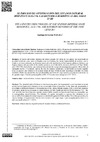Please use this identifier to cite or link to this item:
https://accedacris.ulpgc.es/handle/10553/56292
| DC Field | Value | Language |
|---|---|---|
| dc.contributor.author | Luxán Meléndez, Santiago de | en_US |
| dc.date.accessioned | 2019-08-02T08:33:52Z | - |
| dc.date.available | 2019-08-02T08:33:52Z | - |
| dc.date.issued | 2019 | en_US |
| dc.identifier.issn | 0570-4065 | en_US |
| dc.identifier.uri | https://accedacris.ulpgc.es/handle/10553/56292 | - |
| dc.description.abstract | El interés del estudio histórico del tabaco procede del hecho de que generó una importantísima actividad económica pues, tanto en España como en América, fue fuente imprescindible de recursos para el Estado y, de modo destacado, un elemento sustancial en la vertebración de los imperios atlánticos ibéricos, que llegan a situarse solo por detrás de los metales preciosos en el valor de los trasvases del Nuevo al Viejo Mundo entre 1782-1796. Hasta fechas muy recientes han existido dos campos de investigación separados. De un lado, el monopolio español y su historia interna; de otro, los estancos americanos. La definición de estanco imperial como un proceso que culmina en la segunda mitad del siglo XVIII requiere un enfoque articulado de ambas realidades. Desde esta perspectiva, hay que desarrollar una visión de larga duración que podemos estructurar en dos grandes etapas. Una fase premonopólica (1606-1717) y una etapa monopólica (1717-1817). | en_US |
| dc.description.abstract | The historical study of tobacco is very interesting given that it generated a very important economic activity both in Spain and in America, it was an essential source of resources for the State and, prominently, it constituted a substantial element in the organization of the Iberian Atlantic empires, with a value only surpassed by precious metals in the exchanges of goods between the New World and the Old World between 1782-1796. Until recently there have been two separate research fields, namely the Spanish and American monopolies and its corresponding internal histories. The definition of imperial monopoly as a process that culminates in the second half of the eighteenth century requires an articulated approach of both realities. From this perspective, we have to develop a long-term vision that we can structure in two major stages: a pre-monopoly phase (1606-1717) and a monopoly phase (1717-1817). | en_US |
| dc.language | spa | en_US |
| dc.relation | la Configuración de Los Espacios Atlánticos Ibéricos. de Políticas Imperiales A Políticas Nacionales en Torno Al Tabaco (Siglos Xvii-Xix).- | en_US |
| dc.relation.ispartof | Anuario de Estudios Atlánticos | en_US |
| dc.source | Anuario de Estudios Atlánticos [ISSN 0570-4065], n. 65, p. 961-1011 | en_US |
| dc.subject | 55 Historia | en_US |
| dc.subject.other | Renta del tabaco | en_US |
| dc.subject.other | Estanco imperial del tabaco hispánico | en_US |
| dc.subject.other | Historia institucional | en_US |
| dc.subject.other | Tobacco income | en_US |
| dc.subject.other | Imperial system of hispanic tobacco | en_US |
| dc.subject.other | Institutional history | en_US |
| dc.title | El proceso de construcción del estanco imperial hispánico 1620-1786. Las reformas borbónicas del siglo XVIII | en_US |
| dc.title.alternative | The construction process of the Spanish imperial state monopoly, 1620-1786. The bourbon reforms of the 18th century | en_US |
| dc.type | info:eu-repo/semantics/article | en_US |
| dc.type | Article | en_US |
| dc.investigacion | Artes y Humanidades | en_US |
| dc.type2 | Artículo | en_US |
| dc.identifier.ulpgc | Sí | es |
| dc.description.dialnetimpact | 0,0 | |
| dc.description.dialnetq | Q2 | |
| dc.description.dialnetd | D4 | |
| item.fulltext | Con texto completo | - |
| item.grantfulltext | open | - |
| crisitem.project.principalinvestigator | De Luxán Meléndez, Santiago | - |
| crisitem.author.dept | GIR G9-Historia, economía y sociedad | - |
| crisitem.author.dept | Departamento de Ciencias Históricas | - |
| crisitem.author.orcid | 0000-0002-7190-9647 | - |
| crisitem.author.parentorg | Departamento de Ciencias Históricas | - |
| crisitem.author.fullName | De Luxán Meléndez, Santiago | - |
| Appears in Collections: | Artículos | |
Page view(s)
725
checked on Dec 28, 2024
Download(s)
244
checked on Dec 28, 2024
Google ScholarTM
Check
Share
Export metadata
Items in accedaCRIS are protected by copyright, with all rights reserved, unless otherwise indicated.
